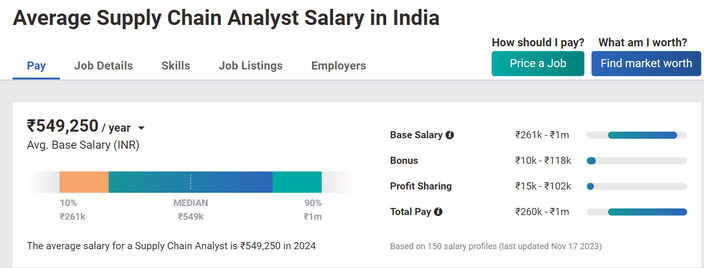
- jaro education
- 26, February 2024
- 2:00 pm
Business professionals across various industries are well aware of the pivotal role data plays in shaping strategic decisions. While the concept of “analytics” is not new, its integration into specific domains remains a dynamic and ongoing process. One such arena experiencing a transformative shift is Operations Management (OPMA) and Supply Chain Management (SCM). In these fields, the fusion of data management and analytics is a relatively recent development, ushering in a wave of opportunities and challenges.
About 55% of manufacturing businesses aim to improve their visibility in the supply chain. If you’re interested in a career as a Supply Chain Analyst, it requires an in-depth understanding of the unique demands of the field. It might seem challenging, but don’t worry! This blog will help you understand the step-by-step process of starting a career in Supply Chain Analytics and give you insights regarding the supply chain analyst roles, responsibilities, and different career paths.
What is the Supply Chain?
Making and delivering a product involves a big and complex process. It can be made nearby or come from far away. This journey, from creating the product to getting it to the buyer, is called the supply chain. Many companies and people work together to make this happen. It’s a big process that needs careful attention because different things can mess it up.
When the supply chain gets messed up, it often means prices suddenly change for everyday things. People who study the supply chain, called supply chain analysts, have a tough job. They have to work with many different parts of a company and talk to people inside and outside the company to make sure everything goes well.
Sometimes, problems like political issues or big events, such as wars or the pandemics like COVID-19, can stop or mess up the supply chain. This leads to shortages and makes the prices of things go up. Managing the supply chain is not easy, but it’s important to have smart and experienced people to handle all the challenges and make sure things run smoothly.
Table of Contents
Who is a Supply Chain Analyst?
A supply chain analyst is vital for a company’s smooth operation. They plan, study, and keep an eye on how products move through the supply chain to ensure they reach their destinations on time and without costing too much.
These analysts usually focus on specific projects, like launching a product in a new country or finding cheaper routes or suppliers. They act as a connection between the company and its suppliers, often located overseas. Their job involves researching fair prices, negotiating deals, and keeping an eye on the amount of products in warehouses using tools like SAP.
What are the Roles and Responsibilities of Supply Chain Analyst
Supply chain analysts play an important role in facilitating the procurement of goods from overseas for organizations, overseeing comprehensive projects to ensure a smooth transition of products from one point to another.
Key responsibilities and tasks associated with the role of a supply chain analyst include:
- Monitoring current business operations by overseeing various aspects such as sourcing, warehousing, deliveries, and production scheduling.
- Collecting and examining data to reduce costs and enhance overall efficiency within the supply chain.
- Utilizing tools like SAP to manage and streamline supply chain processes and inventory.
- Cultivating and sustaining professional relationships with vendors, serving as representatives of the company or organization to maintain a positive image.
- Continuously exploring opportunities to enhance supply chain management by assessing approaches, processes, tools, and technology.
Skills Required To Become a Supply chain Analyst
Technical Abilities
Data Analysis
This entails the examination of data using diverse software and tools, with the primary goal of determining the most cost-effective route for the supply chain.
Mathematical Proficiency
Proficiency in mathematics, including quick calculations, proves beneficial when discussing options with supply chain stakeholders. The applications of mathematics are evident in logistics, automation, optimization technologies, predictive maintenance, machine learning, and inventory management.
Quantitative and Analytical Skills
Essential for scrutinizing extensive data sets and extracting meaningful insights. Moreover, the ability to make informed judgments based on data is critical.
Project Management
Supply chain analysts are tasked with specific projects, necessitating team management, multitasking, and the capability to oversee project operations seamlessly. Leadership skills play a pivotal role in project handling and management.
Non-Technical Competencies
Logical Reasoning
Given that the available information constitutes a set of facts, employing logical reasoning is crucial to eliminating bias and achieving optimal results. It also proves essential in assessing the feasibility of proposed modifications and identifying suitable alternatives.
Interpersonal Aptitude
Effectively interacting with various authorities, stakeholders, and consumers requires strong interpersonal skills to comprehend the challenges faced by each party and the company. Active listening, empathy, and relationship building are highly valued skills.
Communication Prowess
Effectively conveying ideas, suggestions, and improvements with clarity and logical reasoning is imperative. A supply chain analyst must possess the ability to influence listeners through articulate and compelling communication.
Organizational Skills
Efficient multitasking and collaboration with different teams hinge on the effective organization. This not only enhances efficiency but also contributes to better outcomes and workload management without experiencing burnout.
Team Collaboration
Engaging in projects, training supply chain teams, and collaborating with various departments demands adept handling of individuals. It involves the skill of interacting with everyone, irrespective of personal relations or shifts in ideologies.
Qualifications Required to Become a Supply Chain Analyst
To build a career as a supply chain analyst, candidates should have a bachelor’s degree in Mathematics, Logistics, Business Analytics, or a related field.
Preferably, individuals with prior experience in roles like supply chain analyst, logistics coordinator, or similar positions gained through internships are highly valued. Additionally, candidates should demonstrate proficiency in the following tools and exhibit the specified supply chain analyst skills:
- Proficient in MS Office
- Familiarity with ERP systems, such as SAP, and understanding of supply chain processes and relational databases
- Problem-solving aptitude
- Attention to detail
Previous experience with SQL analysis tools is advantageous
Salary Trends for Supply Chain Analyst

*payscale.com
As per payscale, an average base salary of ₹549,250 per year. Additionally, the salary range is depicted with a 10% mark at ₹261k (indicating that 10% earn less than this amount), a median point at ₹549k, and a 90% mark at ₹1m (indicating that 90% earn less than this amount). Also, It includes potential additional earnings such as bonuses, ranging from ₹10k to ₹118k, and profit sharing, ranging from ₹15k to ₹102k. The total pay, which combines base salary, bonuses, and profit sharing, ranges from ₹260k to ₹1m.
As per data from the US Bureau of Labor Statistics, logisticians receive an annual median salary of $77,030. It is noteworthy that the projected job growth for this occupation is 28 per cent from 2021 to 2031, significantly surpassing the average growth rate for all occupations, which stands at 8 %.
The median salaries for supply chain analysts in various industries are as follows :
| Industry | Median Salary |
|---|---|
| Management of companies and enterprises | ₹14,00,390 |
| Manufacturing | ₹ 14,50,000 |
Given the expanding landscape of e-commerce, the demand for just-in-time deliveries is on the rise. The future outlook for careers in the supply chain domain appears promising.
How to Pursue a Career as a Supply Chain Analyst
To start a career as a supply chain analyst, it is recommended that you hold a bachelor’s degree. If you already possess one and are considering a career change, you can bypass the initial step and focus on enhancing your skills and accumulating work experience.
Here is a step-by-step guide to kickstart your journey as a supply chain analyst:
Obtain a Bachelor’s Degree
While not mandatory for all supply chain analyst positions, having a bachelor’s degree significantly improves your chances of securing employment. A degree in business administration is particularly advantageous.
Zippia surveyed that 72.8 per cent of supply chain analysts hold a bachelor’s degree, and 15 per cent have master’s degrees. Given the intricate and fast-paced nature of supply chain management, it is essential to possess a solid technical grasp of tools like SAP. Additionally, a strong foundation in business acumen, problem-solving, and quantitative analysis is crucial.
Working professionals who want to leverage their careers can also pursue valuable courses on supply chain management that can help them climb the ladder of manager-level roles. One such program is Advanced Supply Chain Management and Role of Analytics
IIM Kozhikode. This comprehensively explains the intricacies of Supply Chain Management (SCM) while establishing a solid foundation in relevant concepts.
For those in need of technical proficiency, familiarize yourself with tools like SAP or Excel. Short guided projects on Finding, Sorting, & Filtering Data in Microsoft Excel, and Creating Charts and Dashboards using Google Sheets can aid in becoming more proficient with Microsoft Excel.
Apply for Entry-level Positions
Now that you have honed your skills, it’s time to apply for entry-level positions. Begin by researching companies or organizations that align with your career goals and narrow down your search accordingly.
Ensure your resume is well-crafted or make necessary updates, and compose an original cover letter tailored to the supply chain analyst roles that capture your interest. If you are transitioning careers, modify your resume and refresh your interviewing skills accordingly.
Job Roles for Entry-Level Supply Chain Analysts
Supply chain analyst roles lack consistent descriptions or classifications. To address this, we’ve compiled insights into the most prevalent types of positions for Supply Chain Analysts.
Sourcing Analyst
This role involves collecting and analyzing data to assess the efficiency of a company’s sourcing spending. Sourcing Analysts focus on supply markets, evaluate current vendors, and engage with potential new ones. They establish and maintain relationships with both suppliers and internal/external buyers, ultimately formulating an optimal sourcing strategy.
Materials Analyst/Planner
Materials Analysts manage the availability of raw materials and coordinate with sourcing, production, and transportation teams to ensure timely and efficient delivery for finished goods production.
Production Analyst
Production Analysts prepare production schedules and plans using scheduling tools and forecasting models. Some companies divide this role into production planners and schedulers.
Inventory Analyst
Inventory Analysts determine optimal inventory targets for products and locations, tracking actual inventory and customer service goals to maintain low inventory while ensuring customer satisfaction.
Demand Planning Analyst
This role involves creating and maintaining forecast models related to customer demand, incorporating business intelligence with data from sales and marketing. Demand Planning Analysts coordinate with various supply chain teams to develop strategies focused on demand planning.
Deployment Analyst
Deployment Analysts ensure locations have the optimal product quantities. They collaborate with other supply chain teams to ensure finished goods meet customer service goals at minimal cost.
Transportation Analyst
Transportation Analysts evaluate, select, and manage carriers for inbound and outbound goods. They handle relationships with internal/external customers and carriers, implementing initiatives to reduce transportation costs.
Supply Chain Modeling Analyst
Modeling Analysts build mathematical models of the supply chain, utilizing advanced analysis skills like optimization and simulation to enhance overall performance.
Various other supply chain analyst positions may exist based on organizational needs, but the aforementioned roles are among the most popular in the industry. Typically, supply chain analysts work in multiple roles before advancing to positions of greater responsibility. Career progression may involve transitioning from roles in demand planning, production, and inventory to senior analyst, supply chain manager, and potentially a leadership position, contingent on demonstrated capabilities and organizational needs.
Career Path of Supply Chain Analyst
The professional trajectory for a Supply Chain Analyst may resemble a dynamic and thrilling roller coaster experience. Commencing in the role of a Supply Chain Analyst, you may progress into managerial positions with responsibilities for overseeing various supply chain activities. With substantial experience and demonstrated competence, the possibility of advancing to the role of a Supply Chain Director becomes achievable.
What makes this career path intriguing is its lack of a fixed template – based on your interests and skills, you have the flexibility to explore opportunities in procurement, manufacturing, project planning, or distribution. The possibilities are vast and adaptable to your preferences and capabilities.
Conclusion
As the demand for skilled professionals in this field continues to rise, it is crucial to cultivate the appropriate skill sets that will set you apart as a standout candidate in the competitive job market. By honing your abilities in problem-solving and data analysis now, you are not only preparing yourself for a rewarding career but also positioning yourself as an invaluable asset in the evolving landscape of supply chain management. Seize the opportunity to become a key player in shaping the future of this dynamic field by focusing on acquiring the right skills today.









